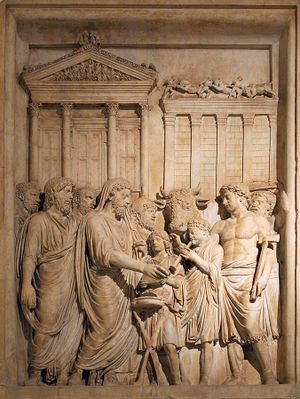Imperial Cult of Rome: Difference between revisions
No edit summary |
No edit summary |
||
| Line 5: | Line 5: | ||
Octavius became Augustus. His reforms transformed Rome's Republican system of government to a de facto monarchy. He maintained traditional Roman practices and ''Republican values'' in name only. | Octavius became Augustus. His reforms transformed Rome's Republican system of government to a de facto monarchy. He maintained traditional Roman practices and ''Republican values'' in name only. | ||
One of the things he did was to expand the system of [[Corban|Qorban]] administered through the [[Temples]] of [[Rome]]. This was a [[welfare]] system that would become a [[Snare]] and make the people [[merchandise]] or a [[surety]] for debt. This debt would bind the people through their [[Covetous Practices]] and [[Curse children|curse the children]] of the people with debt into the [[Imperial Cult of Rome]] where they could not just get out. | One of the things he did was to expand the system of [[Corban|Qorban]] administered through the [[Temples]] of [[Rome]]. This was a [[welfare]] system that would become a [[Snare]] and make the people [[merchandise]] or a [[surety]] for debt. This debt would bind the people through their [[Covetous Practices]] and [[Curse children|curse the children]] of the people with debt into the [[Imperial Cult of Rome]] where they could not just get out or come out of that imperial system of social [[welfare]]. | ||
As ''princeps'' or the president of Rome and commander in chief of the army and navy | As ''princeps'' or the president of Rome and ''commander in chief'' of the army and navy as Emperor<Ref>“Emperator, emperatoris m. commander in chief “Collins L.E. Dict. ‘62. This was the head of the Roman military, army and navy.</Ref> he was expected to balance the interests of the Roman military, the Senate and the people maintaining peace, security and prosperity throughout an ethnically diverse empire of different states. | ||
In 30 BC, libation-offerings to the ''genius of Augustus'' became a duty at public banquets or festivals which were a part of the Roman [[Welfare|welfare]] system. From 12 BC, state oaths were [[Christian conflict|sworn by the ''genius'' of the living emperor]]. | In 30 BC, libation-offerings to the ''genius of Augustus'' became a duty at public banquets or festivals which were a part of the Roman [[Welfare|welfare]] system. From 12 BC, state oaths were [[Christian conflict|sworn by the ''genius'' of the living emperor]]. | ||
Revision as of 06:05, 7 April 2016

The Imperial cult of ancient Rome identified emperors and some members of their families with the divinely sanctioned authority of the Roman State.
This idea is the same concept of the divine right of kings which gave men the right to literally decide good and evil as ruling judges and usurp the right of the individual members of society to decide fact and law.
Octavius became Augustus. His reforms transformed Rome's Republican system of government to a de facto monarchy. He maintained traditional Roman practices and Republican values in name only.
One of the things he did was to expand the system of Qorban administered through the Temples of Rome. This was a welfare system that would become a Snare and make the people merchandise or a surety for debt. This debt would bind the people through their Covetous Practices and curse the children of the people with debt into the Imperial Cult of Rome where they could not just get out or come out of that imperial system of social welfare.
As princeps or the president of Rome and commander in chief of the army and navy as Emperor[1] he was expected to balance the interests of the Roman military, the Senate and the people maintaining peace, security and prosperity throughout an ethnically diverse empire of different states.
In 30 BC, libation-offerings to the genius of Augustus became a duty at public banquets or festivals which were a part of the Roman welfare system. From 12 BC, state oaths were sworn by the genius of the living emperor.
These human gods and their temples had a function in society and their governments that is commonly misunderstood because if we did it might change the world of religion and our understanding of the Kingdom of God.
Once you began to understand words like Apotheos which made Caesar and appointor of gods through out the empire then you will need to know who those gods were and are today. Understanding that the Senators of Rome were the Fathers of the earth Jesus spoke of will also change individual views of the gospel. The role these Conscripted fathers played as the Pater Patriae and Patronus made them the Benefactors who exercised authority one over the other in a Welfare system that was a Snare.
History repeats itself and the parameters we often hold sacred are actually parallels the prophecy our own fate.
This was at the root of the Christian conflict which made the people Merchandise and brought them back into Bondage.
So what is the deference between Religion, Public religion, Pure Religion, False religion and a Cult which leads to Covetous Practices which curse your children.
How are we the same as Rome? Rome vs US
Cult |
Imperial Cult of Rome |
Rome |
Christian conflict |
The Democracy Cult |
Supreme being |
Diocletianic Persecution |
Gods |
Religion |
False religion |
If you need help:
- Or want to help others:
Join The Living Network of The Companies of Ten
The Living Network |
Join Local group |
About |
Purpose |
Guidelines |
Network Removal
Contact Minister |
Fractal Network |
Audacity of Hope |
Network Links
- ↑ “Emperator, emperatoris m. commander in chief “Collins L.E. Dict. ‘62. This was the head of the Roman military, army and navy.